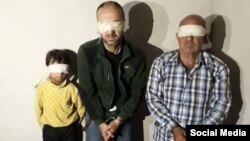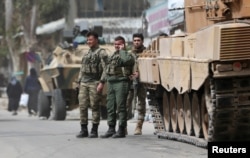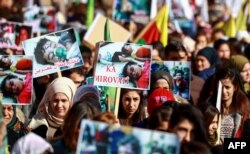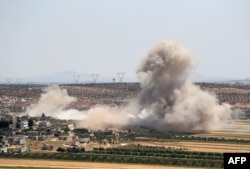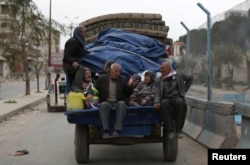Rights groups are expressing concerns over the increasing abuses against civilians by rebel forces in the northwestern Syrian city of Afrin.
Last week, a 10-year-old boy with Down syndrome, who was kidnapped by a rebel group, was killed along with his father and grandfather after their family failed to pay the kidnappers a ransom of $10,000, local media reported.
Such incidents have been rampant since Turkish military and allied Syrian rebels took control of Afrin after a two-month-long military campaign that ousted the Kurdish People’s Protection Units (YPG) from the region in March 2018, rights groups said.
“There has definitely been an uptick in terms of persecution of anybody that shows any kind of dissent to Turkish or rebel presence in Afrin,” said Philippe Nassif, the Middle East and North Africa advocacy director at Amnesty International.
He added that “behaviors such as [kidnapping for] ransom and indefinite detentions and the fear of just being out and about living your life in Afrin is very real for all residents.”
Turkish military, rebel groups
In addition to the Turkish military, there are at least a dozen rebel groups in control of Afrin, including the National Liberation Front and several other Islamist groups who have been accused by rights groups of committing crimes against the local population in the Kurdish-majority city.
In February, the United Nations’ Independent International Commission of Inquiry on Syria released a report assessing the situation in Afrin.
“The commission finds there are reasonable grounds to believe that armed group members in Afrin committed the war crimes of hostage-taking, cruel treatment, torture, and pillage,” the report said.
“Numerous cases involving arbitrary arrests and detentions by armed group members also included credible allegations of torture and ill-treatment, often targeting individuals of Kurdish origin, including activists openly critical of armed groups and those perceived to be so,” the U.N. report added.
Turkey’s responsibility
Rights experts say that Turkey has a responsibility to stop such violations and to protect civilians in the Syrian city.
“Turkey is an occupying power, so it absolutely has an obligation to be responsible for the actions of its proxy forces that are operating within Afrin,” said Nassif of Amnesty International.
He told VOA that Turkey instead has “empowered them to go after anybody who is opposed to the presence of these groups. They have empowered these groups to particularly carry out some of Turkey’s own domestic agenda when it comes to crushing Kurdish resistance.”
Ankara views the Kurdish YPG as part of the Kurdistan Workers’ Party (PKK), which has been engaged in a three-decade war with Turkish armed forces for greater Kurdish rights in Turkey. The PKK is considered a terrorist organization by Turkey, the United States and the European Union.
Since pushing back Kurdish YPG fighters from Afrin in March 2018, the Turkish military has rarely commented on the situation there, but during a press conference in January of this year, Turkish presidential spokesperson, Ibrahim Kalin, said that Turkey “is committed to the safety of life and property of Syrians in Afrin.”
Aykan Erdemir, a Turkey expert at Foundation for Defense of Democracies, a Washington-based think tank, says that Turkey’s influence on its proxy forces in Syria has not prevented Turkey-backed rebels from abusing Afrin residents.
“The composition of Turkey-backed rebels and their ethos make them prone to undertaking criminal acts and violating the rights and freedoms of the locals,” he told VOA.
Erdemir added that, “Building an inclusive polity with rule and law and greater governance capacity is the only remedy against such abuses, but Ankara’s Syria strategy implemented through proxy rebels is at odds with such a course of action.”
Limited coverage
With the military developments in the nearby Syrian province of Idlib escalating, the ongoing abuses against civilians in Afrin has received scant attention from the outside world, some experts charge.
“Beyond coverage by local media and some rights groups, the situation in Afrin doesn’t get enough coverage in the Western media,” said Ilhan Tanir, an editor with Ahval News, a Turkish website.
“For observers, what’s happening in Afrin is a ‘small issue’ compared to what’s happening right now in other Syrian regions like Idlib,” Tanir told VOA.
Inside Turkey, pro-government media outlets are misleading Turks by painting the situation in Afrin and Syria in general as a success for the Turkish military, Tanir said.
“When opposition parties in Turkey try to criticize what the Turkish military and its allied Syrian rebels are doing in places like Afrin, they are dubbed as supporters of terrorism,” he said.
Demographic change
The Syrian Observatory for Human Rights, a group that monitors human rights in Syria, says Turkish-backed rebels have been carrying out demographic changes in the Afrin region since taking control of the city in March 2018.
“We have been documenting hundreds of cases of demographic change and forced displacement in Afrin,” Rami Abdulrahman, director of the Syrian Observatory, told VOA.
Turkish analyst Tanir believes the Turkish military is complicit with allegations of settling Arab families across Afrin, including many Syrian refugees who had been living in Turkey since the beginning of Syria’s civil war in 2011.
“It seems that [rebel forces] have already got the green light from Turkey to carry out demographic change and Arabize this Kurdish region,” he said.
Some of the groups that operate under Turkey’s command in Afrin have a goal of turning Afrin into a Sunni Muslim region and resettling people who have been displaced from other parts of the country during the conflict, experts charge.
“This is a pattern that has taken hold in Syria, which has made it even harder to come to a resolution of the conflict,” Nassif said.




